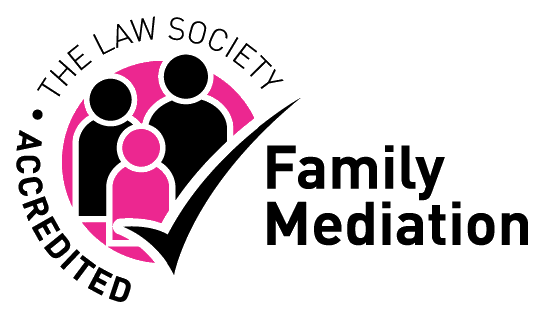Mediation Information and Assessment Meeting (MIAM)
We hope that you will find the following information helpful, concerning the Mediation Information and Assessment Meeting (MIAM )
What is a Mediation Information and Assessment Meeting (MIAM ) ?
This is a meeting between you and our Mediator to find out more about how Mediation might help you find solutions to your own particular family legal problems. The Government wishes to encourage families who turn to the law for help to first find out whether or not Mediation is suitable, and this will be your opportunity to be informed about how Mediation works, and to ask any questions of the Mediation which may be of a concern to you.
What happens at the Meeting?
Our Mediator will explain what happens in a Mediation session and will attempt to answer any questions you may have. It is the Mediator’s duty to form a view whether or not Mediation is suitable for your circumstances and will be of a positive help to you, and it will also be for you to decide whether or not you wish to proceed with Mediation.
What happens if I decide that I do not want to have Mediation?
There will be no pressure on you to choose Mediation if you decide that it is not suitable for you. At the end of the Assessment Meeting, if you and / or our Mediator decide that Mediation would not be helpful at the present time, Mediation will not proceed.
What happens if one of us wants to have Mediation but the other does not?
Mediation can only work if both people involved are committed to resolve their differences in this way. In the circumstances that one person is unwilling to proceed with Mediation, we will respect that choice but always keep the door open to the possibility of Mediation taking place at a later date, if you both subsequently come to the mutual view that you would like to try the Mediation option.
In brief what are the benefits of Mediation?
There are 3 main benefits if couples can resolve their differences with Mediation;
· Costs
If matters proceed through the Courts the cost of a case concerning the residence of or contact to children can be typically between £1,000 and £4,000 per person. Cases involving the resolution of financial matters can cost typically £3,000 – £6,000 per person. These costs can vary according to the complexity of your situation and the Solicitor instructed.
· In your control
When you choose to resolve your matters through Mediation, you retain control of the time scale of your meetings.
· Flexibility
In Mediation you will be discussing a range of ideas to enable you to carefully explore the options alongside each other, without reaching a legally binding agreement. If you settle on a proposal which appears to you to be fair to both of you and any children, we will help by putting the proposal in the form of a Summary, for you to discuss with your Solicitors, before they help you decide whether to make such proposals legally binding. We will also summarise the financial information you have been provided to help you to obtain advice from your Solicitor.
We readily acknowledge that Mediation is not a “soft option”, as it can be difficult speaking with an estranged partner whom you may not have met for some time or sometimes a current partner whom you are experiencing difficulties. However, we hope that with the assistance of trained, impartial and experienced Mediator, you will be able to reach the best solutions for your family.
What happens if I want a form to apply to the court (eg FM1 form, C100 form, Form A)?
In some circumstances we understand Mediation may be inappropriate and unfortunately court proceedings are necessary. This may be determined by you, a Solicitor or a Mediator.
In some other circumstances one party or both parties may decide Mediation is not for them and would wish to apply to the court.
We appreciate if a court application (e.g. C100 form or Form A) is felt necessary by you and/or your legal representative then you require a Mediator to complete part of a court application to say you have attended a MIAM. Once you have attended a MIAM the Mediator can do this and this is included in the cost of the MIAM.
PLEASE NOTE : once you have been provided with the form it is time limited for you to put in your application – the Mediator will explain this to you at the MIAM.
FURTHER INFORMATION ABOUT THE MEDIATION ASSESSMENT MEETING
Mediation is a voluntary process which is offered as an alternative to going to court.
At assessment meetings you will be asked some questions about your personal circumstances and we will consider with you whether or not Mediation might be suitable for you and your former partner and the circumstances of your particular case.
The purpose is to explore Mediation as a process that may or may not be suitable for you.
Do you need to attend with your former partner or other parties?
It will be assumed that you and your former partner would prefer separate meetings unless you tell us to the contrary You have a choice of attending the assessment meeting either separately or together.. If you do wish to attend jointly then we would ask that you contact ourselves to discuss this beforehand so that we can ensure that the facilities are available should you need to be seen separately from your former partner and if you are attending together then we would need to know prior to the meeting whether there have been any incidents of physical, emotional or sexual abuse between yourself and your former partner.
How long do the meetings take?
The initial assessment meeting (MAIM) would tend to take 45 minutes and can be arranged, changed or cancelled by telephone or email (or attending our office if you find this easier). Please give us at least 24 hours’ notice if you wish to cancel or change your appointment.
Can children attend?
We would ask that you note that due to the nature of the matters that will be discussed, it is not suitable for children to attend the meetings with you.
Can I bring someone with me to the MIAM or Mediation session?
We ask that you do not bring anyone else with you due to the confidential nature or the matters to be discussed. Also, the other party may very well object to other people’s involvement. Only if both parties consent and the Mediator feels it is appropriate that someone else be involved would it be considered.
What happens if I am not suitable for Mediation?
The Mediator will discuss this with you individually and also contact your Solicitors to inform them of this.
Do I still need a Solicitor?
The Mediator will confirm to you during the Mediation session that it is important for all clients to continue to have access to legal advice throughout the Mediation process. You should contact your Solicitor if you need advice about any legal issues which arise during the Mediation process or outside of Mediation.







